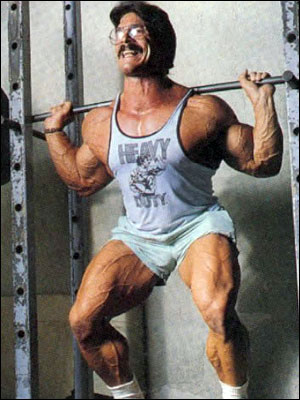
Click Here for Free Bodybuilding and Fitness Magazine Subscription
Mike Mentzer Failure Training
Introducing The New Mike Mentzer High Intensity Training Book...
Mike Mentzer and Me: My Heavy Duty Journal of High Intensity Training The Logical Approach to Bodybuilding
If you want to make the best progress with High Intensity Training you can't just follow a routine you found online, you need to fully understand the theory and practice of it so you can make any necessary adjustments so that it will actually work for you.
I wrote this book to share with you everything I learned over the past 45 years, what works, what doesn't and how to tailor High Intensity Training for your own unique body, exercise tolerance and recovery ability.
Go to https://www.trulyhuge.com/mike-mentzer-book.html
Mike Mentzer What Is Muscle Failure?

By Paul Becker
Q. I have been reading about Mike Mentzer and I have just one question. What did Mike Mentzer mean by 1 set to failure? It is positive reps failure? Or positive, negative and static hold all together failure. Please advice.
A. One of the questions, I had and you might have is "What did Mike consider failure?", well if you get to a point where you complete that last seemingly impossible full rep, that's failure. No need to do forced reps, negatives, etc.
Is Training to Total Failure Necessary?
When I was doing Mike Mentzer's original Heavy Duty routine, I took failure literally - meaning for example on a set of curls I would keep going until at some point I hit the point were I couldn't get the next rep. The bar would stick and I couldn't get it into the top position. At times, if I had a training partner, I would do some forced reps and even some negatives after reaching failure. At one point, after I reached failure, I would keep fighting against the unmoving weight for up to 15 seconds. It was exhausting, sometimes I would have to lay down on my basement floor for a while after my work out until could catch my breath and feel good enough to go back upstairs.
Of course, on exercises like bench press and squats, it's too dangerous to do this so I just finished that last super hard rep and racked the weight. And over time I noticed that I was making better progress on those exercises and it wasn't killing me.
So I decided to do all my exercises that way and not purposely try to fail, I made better progress in strength, had more energy and a lot less general fatigue.
It would seem that Mike Mentzer had at some point reached a similar conclusion, as when he trained me he stopped me after that last successful super hard rep and said; "Ok that's enough that's failure".
Also, after the workout, when he sat down to talk for awhile, he agreed that the most important thing was progression - lifting more weight or doing more reps over time. Of course you have to push yourself to do more over time and that can very hard, but every set of every workout doesn't have to feel like you just went through a life or death struggle.

